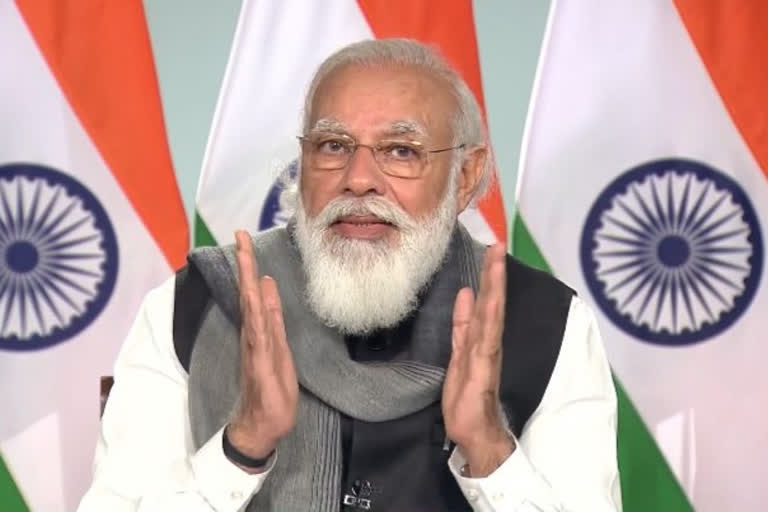Business Desk, ETV Bharat: Making a simple statement that highlights the central government’s focus on tapping the full potential of public-private partnership in India’s space sector, Prime Minister Narendra Modi on Monday assured space start-ups of full support, that too under his direct supervision.
In a roughly 45-minute meeting with private space industry leaders over video conferencing, Modi not just showed keen interest in all the projects, but also asked the participants to directly write to him or the Prime Minister’s Office on any issues they face, said a person present at the meeting on condition of anonymity.
Modi, along with Indian Space Research Organisation (ISRO) chairman K. Sivan, on Monday interacted with eight private players operating in the space sector “to encourage their participation in space activities”, said a press release by the Prime Minister's Office.
Apart from Bharti Enterprises founder and chairman Sunil Bharti Mittal and Larsen and Toubro’s whole-time director Jayant Patil, other participants included representatives from space start-ups like Agnikul Cosmos Pvt. Ltd, Skyroot Aerospace Ltd, Alpha Design Technologies Pvt. Ltd., MapmyIndia, PIXXEL India and Space Kidz India.
During the meeting, one of the main suggestions that came from the private sector was to fast-track the development of Isro’s new launchpad at Tuticorin in Tamil Nadu, said the person quoted above.
India currently has one rocket port at Sriharikota in Andhra Pradesh. The Tuticorin launch centre has a strategic advantage as rockets launched from there can fly straight to the south pole without burning fuel to swerve around Sri Lanka on the way.
This not just helps in saving the rocket’s fuel, but also improves its payload capability.
The meeting also saw private participants asking the government for creation of a separate fund for space start-ups, the person added.
Besides that, a participant also called the need for a single-window clearance system for all licenses and permissions needed by space start-ups in order to expedite their projects.
“The Prime Minister took note of this and said that he would look into the matter,” the person said.
Notably, the government in June this year opened up the space sector to enable the participation of the private sector in the entire gamut of space activities.
Read more: Supply disruptions, low demand for petro, engineering products bring down India's exports
The Indian National Space Promotion and Authorization Centre (IN-SPACe) was created to provide a level-playing field for private companies to use Indian space infrastructure.
Subsequently, several ventures submitted their proposals with IN-SPACe pertaining to a vast range of activities including satellite constellation, small satellite launch vehicles, ground station, geospatial services, propulsion systems and application products.
For instance, Bengaluru-based space start-up Pixxel Space will be launching its first remote-sensing satellite on Isro’s Polar Satellite Launch Vehicle (PSLV) in early 2021.
Speaking to ETV Bharat, Pixxel founder and CEO Awais Ahmed, who was present in Monday’s meeting with the Prime Minister, said: “Pixxel Space plans to send 32 satellite to space to take a high-quality picture anywhere on the Earth at any time.”
“We are planning to send our first Earth Observation Satellite in February 2021 through ISRO launch pad in Sriharikota. Within December 2021, we intend to send our second satellite. In 2022, we will have the constellation of 32 Nano-satellites revolving around the Earth,” Ahmed added.
Earlier this month, a Chennai-based launch-vehicle start-up Agnikul Cosmos became the first company to sign a formal non-disclosure agreement under the IN-SPACe entity.
AgniKul is building India’s first private small satellite launch vehicle. Their vehicle – Agnibaan – is a rocket that will be capable of carrying up to 100 kg of payload to low Earth orbits up to 700 km with a plug-and-play engine configuration.
Under the agreement, Agnikul will be able to work with various ISRO centers to get access to technical information and facilities necessary to go forward with their launch vehicle development.



